
"Funkytown" is a song by the American disco/funk band Lipps Inc., released in 1980 as the second single from their 1979 debut album, Mouth to Mouth. It was successful globally, reaching top spots in places such as the United States, West Germany, Canada, Austria, Switzerland, Norway, the Netherlands, and Australia.
"Mambo No. 5" is an instrumental mambo and jazz dance song originally composed and recorded by Cuban musician Dámaso Pérez Prado in 1949 and released the next year.

"Another Day in Paradise" is a song recorded by English drummer and singer-songwriter Phil Collins. Produced by Collins along with Hugh Padgham, it was released as the first single from his number-one album ...But Seriously (1989). As with his song for Genesis, "Man on the Corner", the track has as its subject the problem of homelessness and paradise; as such, the song was a substantial departure from the dance-pop music of his previous album, No Jacket Required (1985).

"He Ain't Heavy, He's My Brother" is a ballad written by Bobby Scott and Bob Russell. Originally recorded by Kelly Gordon in 1969, the song became a worldwide hit for the Hollies later that year and also a hit for Neil Diamond in 1970. It has been recorded by many artists in subsequent years. The Hollies' version was re-released in 1988 and again was a major hit in the UK.

Sugar, Sugar is a song written by Jeff Barry and Andy Kim. It was originally recorded by the Archies – a fictional band of studio musicians linked to the 1968–69 US Saturday morning TV cartoon The Archie Show, inspired by the Archie Comics. In the autumn of 1969 the single topped both Billboard's Hot 100 and the UK Singles Chart, ranking number one for the year in both America and Britain. “Sugar, Sugar” is the most successful bubblegum pop single of all time, and is widely regarded as the apotheosis of the late-1960s/early-1970s bubblegum music genre. In mid-1970 R&B/soul singer Wilson Pickett achieved success on both the US soul and pop charts with a cover version.

"I Just Called to Say I Love You" is a ballad written, produced, and performed by American R&B singer and songwriter Stevie Wonder. It was a major international hit, and remains Wonder's best-selling single to date, having topped a record 19 charts.

"Hard to Say I'm Sorry" is a power ballad written by bassist Peter Cetera, who also sang lead on the track, and producer David Foster, for the group Chicago. It was released on May 17, 1982, as the lead single from the album Chicago 16. On September 11 it reached No. 1 for two weeks on the Billboard Hot 100. It was the group's second No. 1 single. It was their first top 50 hit since "No Tell Lover" in 1978 and it spent twelve weeks in the top 5 of the Billboard Hot 100. The single was nominated for a Grammy Award for Best Pop Performance by a Duo or Group with Vocal, and was certified gold by the Recording Industry Association of America (RIAA) in September of the same year. Songwriter Cetera, a member of the American Society of Composers, Authors and Publishers (ASCAP), won an ASCAP Pop Music Award for the song in the category, Most Performed Songs.
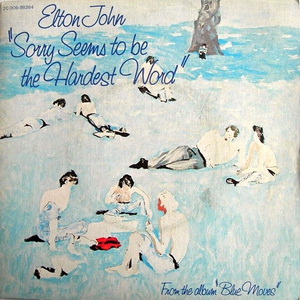
"Sorry Seems to Be the Hardest Word" is a song written by English musician Elton John and songwriter Bernie Taupin. It was recorded by Elton John and released in 1976, both as a single and as part of the Blue Moves album. It was John's second single released by The Rocket Record Company. The song is a mournful ballad about a romantic relationship which is falling apart.

"Hot Stuff" is a song by American singer Donna Summer from her seventh studio album Bad Girls (1979), produced by English producer Pete Bellotte and Italian producer Giorgio Moroder and released as the lead single from Bad Girls in 1979 through Casablanca Records. Up to that point, Summer had mainly been associated with disco songs but this song also showed a significant rock direction, including a guitar solo by ex-Doobie Brother and Steely Dan guitarist Jeff "Skunk" Baxter. It is the second of four songs by Summer to reach number one on the Billboard Hot 100.

"Say You, Say Me" is a song written and recorded by American singer and songwriter Lionel Richie for the film White Nights. The single hit number one in the US and on the R&B singles chart in December 1985. It became Richie's ninth number-one on the Billboard Adult Contemporary chart. The track is not available on the film's soundtrack album, as Motown did not want Richie's first single following the massive success of his 1983 album Can't Slow Down to appear on another label. It was included by Motown on Richie's 1986 release Dancing on the Ceiling.
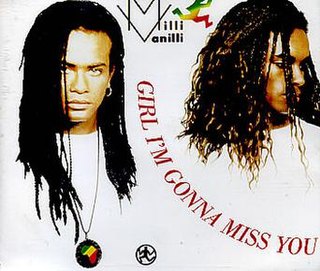
"Girl I'm Gonna Miss You" is a song by German dance-pop group Milli Vanilli. It was released in July 1989 as the third single from their debut album, All or Nothing (1988), as well as its American counterpart, Girl You Know It's True (1989). The single was a success, hitting the number one spot on the US Billboard Hot 100 chart and being certified Gold by the Recording Industry Association of America. The song also reached number one in Austria, Belgium, Canada, the Netherlands and Switzerland, number two in Ireland, the United Kingdom and West Germany, and number three in Australia.

"Luka" is a song written and performed by American singer-songwriter Suzanne Vega, released as the second single from her second studio album, Solitude Standing (1987), in May 1987. It remains her highest-charting hit in the United States, reaching No. 3 on the Billboard Hot 100. Worldwide, the song charted the highest in Sweden, peaking at No. 2, and reached the top 10 in Austria, Canada, New Zealand, and South Africa. Shawn Colvin sings background vocals on the record.
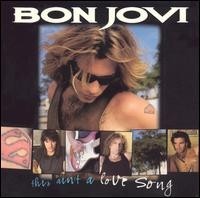
"This Ain't a Love Song" is the lead single from American rock band Bon Jovi's sixth studio album, These Days (1995). The rock ballad is an example of the strong rhythm and blues influence that Jon Bon Jovi and Richie Sambora wanted the album to have. It reached number 14 on the US Billboard Hot 100, number two on the Canadian RPM Top Singles chart, number six on the UK Singles Chart, and number one on the Finnish Singles Chart.
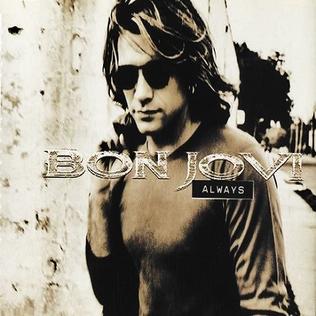
"Always" is a song by American rock band Bon Jovi. The power ballad was released in September 1994 as a single from their second greatest hits album, Cross Road (1994), and went on to become one of their best-selling singles, with a million copies sold in the US and more than three million worldwide. The song reached number four on the US Billboard Hot 100, becoming his 11th and last top 10 hit. It was an international hit, peaking at number one in Belgium, Canada, Ireland and Switzerland, number two in Australia and the United Kingdom, and number four in Germany. "Always" was Alec John Such's final single with the band before he left in late 1994.

"Can't Get Enough of Your Love, Babe" is a song written, recorded, and produced by American musician Barry White. Released in June 1974 as the first single from his third album, Can't Get Enough (1974), the song topped the US Billboard Hot 100 and Billboard R&B charts and has since become one of his signature tunes. It was his second US chart-topper, after "Love's Theme". It became a gold record in the US. White performed this song live on The Midnight Special in 1974, and on Soul Train on May 24, 1975.
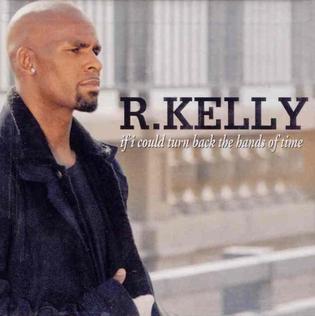
"If I Could Turn Back the Hands of Time" is a song by American singer R. Kelly, released as the fifth single from his third album, R. (1998). The song is a ballad about a man wishing he could go back in time and repair his relationship with his girlfriend. The song peaked at number 12 on the US Billboard Hot 100 and became a top-10 hit across Europe, peaking at number one in Belgium, the Netherlands, and Switzerland.

"Believe" is a song by English musician Elton John. It was the first single from his twenty-fourth studio album, Made in England (1995), and was released on 20 February 1995. Several versions of the single were released, featuring B-sides such as "Circle of Life" from The Lion King and live versions of tracks including "The One", "The Last Song", "Sorry Seems to Be the Hardest Word" and "Believe", which were recorded at the Greek Theatre in Los Angeles.

"Casanova" is a 1987 single by American R&B vocal group LeVert, written and produced by Reggie Calloway. It reached number five on the Billboard Hot 100 singles chart and number nine on the UK Singles Chart, LeVert's only Top Ten on either chart. It was the first new jack swing song to reach number one on the Billboard Hot Black Singles chart. It topped the chart for two weeks, becoming the group's second number-one. It has become a standard number for New Orleans brass bands following its popularization by the Rebirth Brass Band. The song is featured in 1987's The Pick-Up Artist, starring Robert Downey Jr. and Molly Ringwald, and appears on the soundtrack album of the Whoopi Goldberg movie Fatal Beauty, released the same year.

"I'll Be Missing You" is a song by American rapper Puff Daddy and American singer Faith Evans, featuring R&B group 112, in memory of fellow Bad Boy Records artist Christopher "The Notorious B.I.G." Wallace, who was murdered on March 9, 1997. Released as the second single from Puff Daddy and the Family's debut album, No Way Out (1997), "I'll Be Missing You" samples the Police's 1983 hit song "Every Breath You Take" with an interpolated chorus sung by Evans and interpolated rhythm. The song also interpolates the 1929 Albert E. Brumley hymn "I'll Fly Away" and features a spoken intro over a choral version of Samuel Barber's "Adagio for Strings".

"I Can't Tell the Bottom from the Top" is a song by rock group the Hollies, released in April 1970 as a single. It peaked at number 7 on the UK Singles Chart.



















